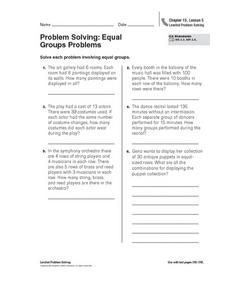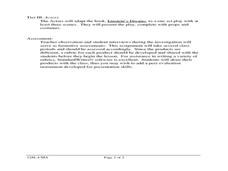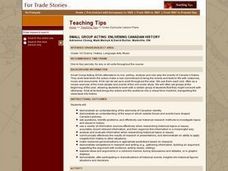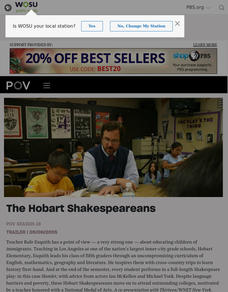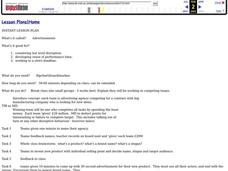Curated OER
Problem Solving: Equal Groups Problems
In this equal groups worksheet, students read the word problems and learn to use equal group numbers to solve the six word problems.
Curated OER
Historical Perspectives
Twelfth graders watch episodes of Star Trek and analyze the works of it that pertain to the theory of relativity. In this creative lesson students also write and illustrate a children's book about the special theory of relativity.
Curated OER
Word Bank; Theater
Pupils are given a word bank relating to theater. In this word bank lesson, students are introduced to a list of words and their definitions. Pupils then build their vocabulary regarding theatrical concepts.
Curated OER
Movies Are Us
Young scholars watch a movie, and answer teacher created questions in order to explore the brain.
Curated OER
The Food Web
Students explore the role that the Arctic hare plays in the Canadian Arctic food web.
Curated OER
"Such Affection Move": Finding Staging Clues in A Midsummer Night's Dream
Students perform various scenes from the play, A Midsummer Night's Dream. They examine and discuss the text and stage directions, then perform their scenes in small groups for the class.
Curated OER
Rethinking Perpetrators, Bystanders, and Rescuers: The Case of Max Schmeling
Students examine the life and actions of Max Schmeling during World War II. They read and analyze an article, compare/contrast Schmeling's choices with other people during this time period, and write a journal response.
Curated OER
Small Group Acting: Enlivening Canadian History
Tenth graders research the elements of Canadian identity and history. They analyze and organize the information. They investigate the concept of Small Group Acting, storyboarding, and writing a good script.
Curated OER
A Study of "Twilight Crane" by Kinoshita Junji
Young scholars read and analyze the Japanese play, "Twilight Crane," by Kinoshita Junji. They read a handout on Japanese theatre, conduct Internet research, answer discussion questions, and compare/contrast versions of the story.
Curated OER
Take One
Students review strategies used to read unkown words. They listen as the teacher reads sentences using a variety of reading fluencies and expressions. They read assigned parts of the play, "Peddler Polly and the Story Stealer" by Aaron...
Curated OER
Aaa-aaa-aaa-choo!!
Pupils study the /a/ sound by mimicking the sound one makes when they sneeze. Next they work with a tongue twister, which they recite while stretching out the initial short a sound. Next, they practice writing the letter and read "A Cat...
Curated OER
Dropping-in a Line
Students read any play (A Midsummer Night's Dream, for example.) They participate in a teacher-led relaxation exercise designed to help the students review specific lines from the play. They write about the experience and answer other...
Curated OER
Words from the Wise
Students explore how famous people, through newspaper Op-Ed articles, often inform the public about issues of national importance. They write Op-Eds in the voice of famous people on current news topics.
Curated OER
What Masks Reveal
Students explore the cultural significance of masks by investigating the role they play in ceremonies and on special occasions in societies from widely separated regions of the world.
Curated OER
Skits and John Adams' Administration
Students perform skits which have been prepared on the events of John Adams' administration, including: The Alien and Sedition Acts, The Judiciary Act of 1801 (The Case of the Midnight Judges), The XYZ Affair, and the Kentucky and...
Curated OER
Rafe's Classroom Secrets
Students consider Rafe's classroom secrets and teaching methods.
Curated OER
Advertisements
Student teams role-play advertising agencies competing for a contract. Winning team completes all tasks, spending the least money. Tasks include naming agency, creating a slogan, inventing a product and advertisement.
Curated OER
Advertisements
Students create their own business and product, and must also create a 30 second advertisement to promote their product.
Curated OER
Semiotics and Set: Year 9
Ninth graders explore semiotics and the meanings of stage sets.
Curated OER
Fools Following the Fools
Students read "The Winter's Tale" in Foole Upon Foole to determine the qualities the author used for a fool. Students role play the character to determine how volume affects the way a character is perceived. Students determine the...
Curated OER
Double, Double, Toil and Trouble: A Dual Exploration of Macbeth
Students emulate a key practice of Renaissance theater: doubling. The goal of this instructional activity is for students to experience-to see, hear, and feel-the differences between characters. Each group presents scenes to the rest of...
Curated OER
"Blame not this haste of mine": Creating a scene for Twelfth Night
Pupils read a section of Shakespeare's, Twelfth Night and write a scene that would fit between scenes 4.1 and 4.3. They present the scene in small groups.
Curated OER
Time For Action
Students research the major waste management facilities in their community and are encouraged to speak with public officials.
Curated OER
Sculpture, Hands, and Rodin
Students explain that Rodin saw hands as able to express the emotions of the entire body. Our hands are important tools and means of expressions. They create a sculpture based on a pantomime they make with their hands.
Other popular searches
- Film Actors
- Monologues for Actors
- Hispanic Actors
- Famous Actors
- Movie Actors
- Actors Studio
- Physical Warm Ups Actors
- Jaws Actors
- Drama Actors
- Mask for Actors
- Greek Actors
- Actors and Characters


